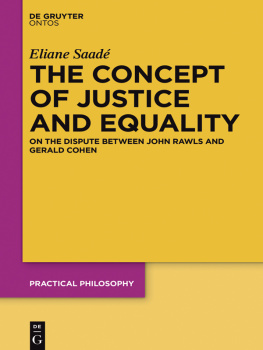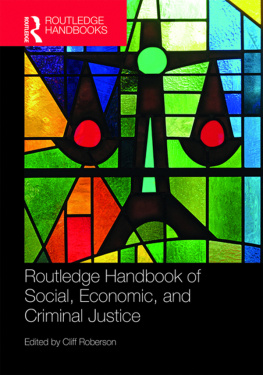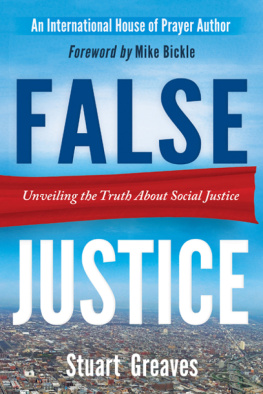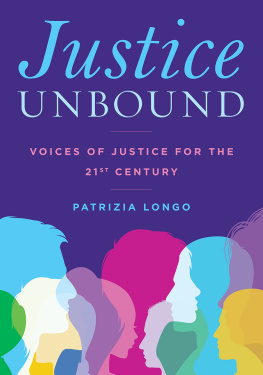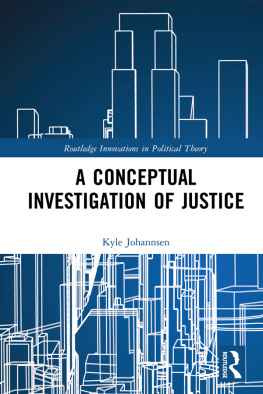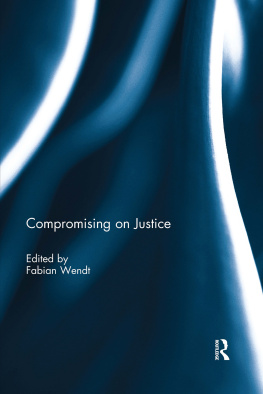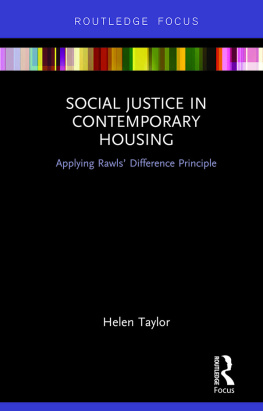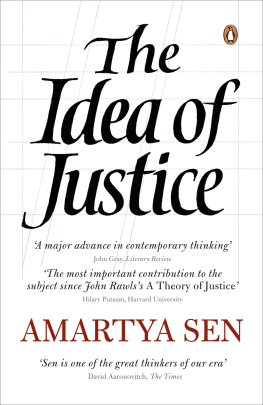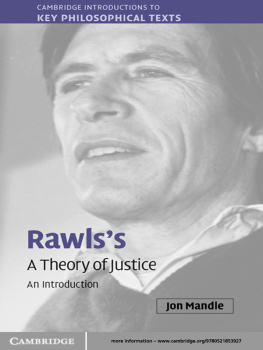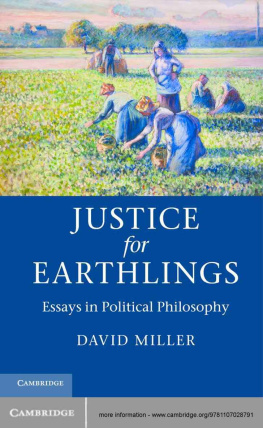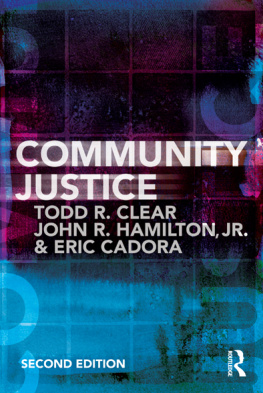Contents

1 The Rawlsian Theory of Justice
One of the aims of Rawlss TJ is to provide an alternative to utilitarian theories of justice which in anglophile philosophy predominated in the 19 th and 20 th centuries, and whose influence has been profound within political philosophy. Utilitarianism is a theory in normative ethics, which judges the moral value of an action by the utility of its consequences. Benthams classical version of this theory defines the utility of an action by the greatest happiness of the greatest number of sentient beings resulting from it, which is evaluated by the sum of pleasures and pains, satisfactions or dissatisfactions.
Nature has placed mankind under the governance of two sovereign masters, pain and pleasure. It is for them alone to point out what we ought to do. [] By the principle of utility is meant that principle which approves or disapproves of every action whatsoever according to the tendency it appears to have to augment or diminish the happiness of the party whose interest is in question: or, what is the same thing in other words to promote or to oppose that happiness. (An Introduction to the Principles of Morals and Legislation: 1)
Like individuals, who balance their gains and losses in order to pursue and to fulfill their desires, society balances the satisfaction and dissatisfaction of its members in order to realize their welfare. In keeping with utilitarian theories, the social institutions of a just society should be ordered in such a way that they satisfy the principle of utility known as the greatest happiness principle. This principle states that society should realize the greatest happiness the predominance, on overall balance, of pleasure or satisfaction over pain or dissatisfaction of the biggest number of its members. However,
for it is by the conception of the impartial spectator and the use of sympathetic identification in guiding our imagination that the principle for one man is applied to society. It is this spectator who is conceived as carrying out the required organization of the desires of all persons into one coherent system of desire; it is by this construction that many persons are fused into one (TJ: 27).
So, if one of the goals of traditional utilitarianism is that the greatest possible number of individuals in society maximize the fulfillment of their desires, the utilitarian theory of justice would allow then the interests of some members in society to remain fused into one, unspecified and thereby unrealized. Would it be fair to surrender the desires of some individuals for the welfare of the larger part of society? Why should such a theory of justice be accepted and put into practice by everyone in society if it treats the interests of some citizens unfairly? From the perspective of justice, it seems that not only the sum of satisfaction of the rational desires of the individuals matters, but also the distribution of this satisfaction between all individuals. In his search for an alternative to utilitarian theories of justice, Rawls focuses on the importance of the interests of each member of a society. Whereas utilitarianism does not take seriously the distinction between persons (TJ: 27) but emphasizes instead the importance of the welfare of the whole society, Rawls thinks it important to stress that [e]ach person possesses an inviolability founded on justice that even the welfare of society as a whole cannot override (TJ: 3). Each person has the equal right to achieve their desires. Therefore a society should be organized in a way that all its members can, in principle, realize their aims. A just society is not achieved when the greatest number of individuals satisfy their desires, but rather when each person in society has the same chance to realize what they strive for. [Justice] does not allow that the sacrifices imposed on a few are outweighed by the larger sum of advantages enjoyed by many (TJ: 4). Therefore, Rawls formulates in TJ and JF, a conception of justice that could be reasonably accepted by all members of a liberal democratic society. His theory, terminology, and methodology are presented in the following by answering two main questions: 1. What are the necessary conditions for a theory of justice that does not sacrifice an individuals interests to the greater benefit of all? 2. Why do the Rawlsian principles of justice prove the most appropriate to regulate societys main institutions, which are in charge of the distributions of rights, duties, and benefits among members of society?
By calling the society democratic and liberal, Rawls identifies the type of society that best suits his theory. Institutions of a liberal democratic society or a reasonably just constitutional democratic society ( The Law of Peoples : 12) function under both ideals of liberty and equality while prioritizing liberty in the assignment of rights and liberties. In a liberal democracy, institutions are informed by the principle of equal liberty, so that citizens may live within social and economic inequalities, as long as they have equal basic rights and liberties, secured by the constitutional democratic regime.
The only reason for circumscribing the rights defining liberty and making mens freedom less extensive than it might otherwise be is that these equal rights as institutionally defined would interfere with one another (TJ: 64).
Basic rights and liberties, which citizens of a just liberal democratic society equally have, include:
political liberty (the right to vote and to be eligible for public office) together with freedom of speech and assembly; liberty of conscience and freedom of thought; freedom of the person along with the right to hold (personal) property; and freedom from arbitrary arrest and seizure as defined by the concept of the rule of law (TJ: 61).
This list presents two kinds of liberties: a positive liberty, which is the freedom to do something, and a negative liberty, which is the freedom from certain constraints imposed by others. Rawls explains the concept of liberty by a reference to three items: the agents, who are free to do something, the limitations to their freedom, and its object. The general description of liberty, then, has the following form: this or that person (persons) is free (or not free) from this or that constraint (or set of constraints) to do (or not to do) so and so (TJ: 202). The constraints are defined by law, so that liberty in the Rawlsian understanding is none other than a structure of institutions and public rules defining rights and duties. The best arrangement of the several liberties depends upon the totality of limitations to which they are subject, upon how they hang together in the whole scheme by which they are defined (TJ: 203). Thus the precedence of liberty corresponds to the priority of the system of equal basic liberties defined according to the principle of liberty that characterizes a liberal democratic society. Whereas exchanges between basic liberties and economic and social advantages are denounced, exchanges between basic liberties are permitted, only if a different basic liberty is protected and the system of liberties as a whole is thereby improved. However, Rawls distinguishes between liberty as a system of institutions, by which basic liberties are defined, and the worth of liberty. While liberty refers to the system of equal basic liberties, the worth of liberty to persons or groups is proportional to their capacity to advance their ends within the framework the system defines (TJ: 204). Although equal liberties are the same for all citizens, the value of liberty is not the same for all, insofar as some citizens due to natural and social differences have greater means and wealth to realize their ideas. But, if the worth of liberty is not the same for all members of society, this means that those individuals, who have finer abilities, are socially and by nature more advantaged than those individuals, with fewer abilities. The more advantaged citizens would reach their aims faster and easier. So, the basic difference regarding the worth of liberty is the cause of other social and economic differences. Thus, the Rawlsian inquiry is: How to realize a just society, even if the worth of liberty and its use differs from one person to another, where everyone would have, in principle, the chance to realize themselves?

